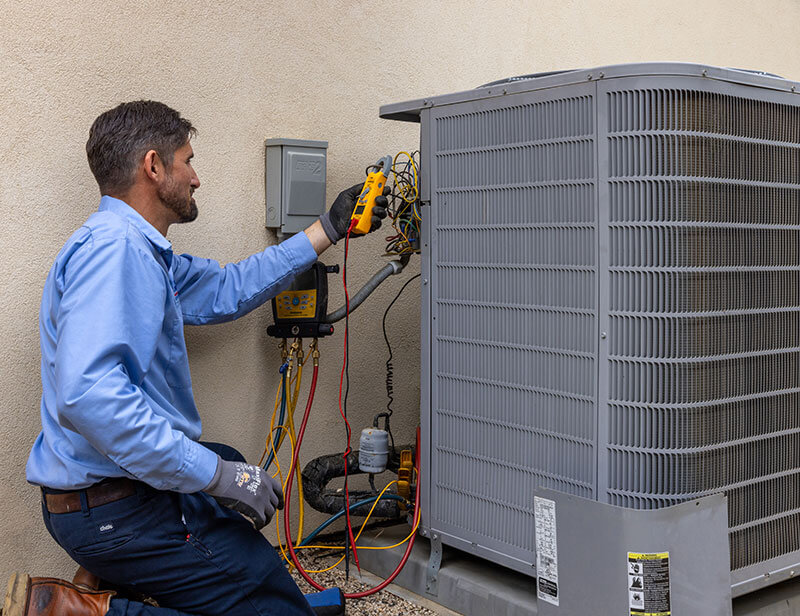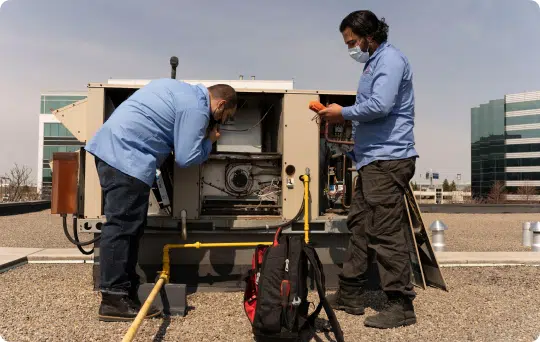Trust DMAKS HVAC for Reliable Heating and Cooling Solutions.
Trust DMAKS HVAC for Reliable Heating and Cooling Solutions.
Blog Article
How to Pick the Right A/c System for Your Requirements
Choosing the suitable A/c system is a crucial choice that requires cautious factor to consider of different elements. The myriad of system kinds readily available can complicate this process, leading one to question which path ultimately leads to optimal comfort and efficiency.
Examine Your Home Dimension
Evaluating your home dimension is a crucial initial step in picking the suitable Cooling and heating system. A Heating and cooling system that is as well tiny will certainly have a hard time to maintain comfy temperatures, leading to enhanced power consumption and wear on the system.
To accurately analyze your home dimension, measure the square footage of each room, taking into consideration factors such as ceiling elevation and the layout. Furthermore, consider the insulation high quality and the number of home windows, as these elements impact thermal performance. Homes with open layout might need different system setups contrasted to those with numerous separated rooms.
Making Use Of the Guidebook J tons calculation technique can give an extra accurate quote of your cooling and heating needs. This technique make up various factors, consisting of local environment, solar gain, and tenancy patterns. By carefully assessing these aspects, you can guarantee that your picked cooling and heating system is suitably sized, bring about enhanced convenience, energy efficiency, and longevity of the equipment.
Determine Your Spending Plan
Determining your budget is an essential action in the a/c system option process, as it establishes the parameters for your choices - DMAKS HVAC. An a/c system is a considerable investment, and comprehending your financial limits will aid limit choices that fit within your means
Begin by assessing not just the first acquisition cost however likewise installment costs, which can vary significantly depending upon the intricacy of the project. Furthermore, consider continuous costs such as maintenance, repairs, and power consumption. A system may appear inexpensive initially yet can result in higher costs in time if it is much less reliable.
It is advisable to designate a contingency fund for unexpected expenses that may arise during installment or first system modifications (DMAKS HVAC). In addition, discover financing alternatives or discounts that might be offered, as these can alleviate the problem of in advance costs
Ultimately, having a clear spending plan permits you to engage with HVAC professionals better, guaranteeing you get tailored advice that aligns with your monetary goals and home demands. By being diligent concerning your spending plan, you can make informed decisions that improve convenience without endangering financial stability.
Evaluate Power Efficiency
Energy efficiency plays an essential function in the general efficiency and cost-effectiveness of your HVAC system. When choosing a system, it is vital to consider its power effectiveness scores, as these numbers straight affect your utility costs and ecological impact. Try to find systems with a high Seasonal Power Performance Proportion (SEER) for cooling and a high Yearly Fuel Use Efficiency (AFUE) score for home heating. Greater scores show higher efficiency, suggesting more comfort for less power intake.
Furthermore, consider the Power Celebrity accreditation, which symbolizes that the system satisfies rigorous efficiency standards established by the Environmental Defense Firm. Buying an Energy Star-rated HVAC system can bring about substantial financial savings with time, especially in locations with severe temperature variations.
An additional element to examine is the system's size and ability. official website An extra-large or undersized device can result in inadequacy and boosted energy expenses. DMAKS HVAC. Correct sizing, usually determined via a Manual J tons calculation, makes certain that the system operates at optimal efficiency


Think About Environment and Setting
When picking a cooling and heating system, it is vital to consider the regional climate and environmental conditions, as these variables substantially affect the system's performance and efficiency. Various regions experience varying temperature level extremes, moisture levels, and seasonal modifications, all of which effect home heating and cooling demands.

Furthermore, local ecological factors, such as air quality and potential irritants, need to educate your option. Solutions equipped with advanced filtration innovations can help minimize toxins and offer cleaner air. Furthermore, take into consideration the energy resources offered in your area-- some HVAC systems are more efficient when powered by gas or sustainable power sources.
Inevitably, aligning your heating and cooling system option with your neighborhood environment and environmental factors to consider will result in boosted comfort, boosted efficiency, and reduced energy expenses.
Explore System Kind and Attributes
As house owners look for to enhance convenience and effectiveness, exploring the various kinds of cooling and heating systems and their unique features comes to be vital. The primary kinds of HVAC systems consist of air conditioning, heatpump, ductless mini-split systems, and heating systems. Each useful reference system uses unique benefits tailored to different needs and preferences.
Central air conditioning systems offer consistent air conditioning throughout a home, making them perfect for larger spaces. Heatpump serve as both heating and cooling down options, utilizing electricity to move warmth, which can cause lower power costs. Ductless mini-split systems are becoming significantly prominent because of their adaptability and convenience of installation, allowing house owners to control the temperature in individual rooms without extensive ductwork.

Verdict
In verdict, choosing the appropriate a/c system necessitates cautious consideration of different elements, consisting of home size, budget restraints, power effectiveness, local environment, and available system types. A thorough assessment of these elements ensures ideal comfort and cost-effectiveness. By adhering to an organized technique, house owners can make informed decisions that straighten with their certain requirements and choices, inevitably leading to boosted interior air quality and energy financial savings.
Report this page